|
|
|
Sort Order |
|
|
|
Items / Page
|
|
|
|
|
|
|
| Srl | Item |
| 1 |
ID:
147824


|
|
|
|
|
| Summary/Abstract |
Despite the fact that urban hukou is understood to be far superior to
rural hukou and that rural migrants have strong intention to stay in
cities for many years, responses to hukou reforms that increase opportunities
to obtain urban hukou have been less than enthusiastic. This
article addresses this puzzle by showing how the respective values of
rural hukou and urban hukou have changed in recent decades. The
access and bene�ts that are tied to rural hukou—including farming and
housing land, compensation for land requisition, and more relaxed birth
control—are considered increasingly valuable. �us, many migrants are
opting to straddle and circulate between the city and countryside rather
than giving up their rural hukou.
|
|
|
|
|
|
|
|
|
|
|
|
|
|
|
|
| 2 |
ID:
184090


|
|
|
|
|
| Summary/Abstract |
It is difficult to conduct ethnographic inquiries into how China’s rural migrant individuals make decisions about their bodies and their sexual capital, and to date there have been few attempts to do so. Equally scant are examinations of the moral, cultural, and political frameworks that rural migrant workers who live in poverty and in the socio-economic margins use to make sense of sexual decisions and choices. This article starts with an ethnographic glimpse into the lives of some sex workers in Shenzhen, and proceeds to analyse a range of texts: a novella, a novel, a cluster of news stories (from both commercial and state media), and a feature story in a popular lowbrow magazine. Pitting these texts against sex workers’ own statements, as well as reading the texts in juxtaposition, brings into sharp relief the contradictions, connections, and coalitions between a range of discursive positions. The analysis suggests that a critical socio-economic framework, rather than a normative framework of transgression, may get us closer to understanding the emotional consequences of inequality. The analysis also demonstrates that for investigations into how inequality shapes intimacy, cultural texts may contain useful ethnographic insights that complement more traditional ethnographic methods.
|
|
|
|
|
|
|
|
|
|
|
|
|
|
|
|
| 3 |
ID:
110046
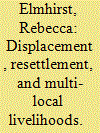

|
|
|
|
|
| Publication |
2012.
|
| Summary/Abstract |
This article examines shifting attitudes toward rural migrants in Lampung Province, on the Indonesian island of Sumatra, in the context of a history of enclosure, commercial expansion, and dispossession. The author examines how contemporary multi-local livelihoods in Lampung reflect an adaptation to the vulnerabilities associated with being a migrant, as people position themselves to qualify for livelihood resources. The author's interpretation draws on Michel Foucault's analysis of the production of governable subjects and, in particular, norms of conduct that produce subjectivities and identities that "fit." The article explores how different policy phases associated with environmental governance in Lampung have created contrasting positionings and norms of conduct for migrants, as they have been defined, on the one hand, as pioneer entrepreneurs, bringing progress to Indonesia's hinterland, and, on the other, as forest squatters, threatening the cultural and ecological integrity of the province. The author suggests that rural migrants have attempted to resolve their problematic positioning through multi-local livelihoods, which combine access to nonlocal income through temporary migration with the maintenance of a foothold that signals belonging and legitimate entitlement to state resources.
|
|
|
|
|
|
|
|
|
|
|
|
|
|
|
|
| 4 |
ID:
158542


|
|
|
|
|
| Summary/Abstract |
For China's rural migrants, the intention to settle in a city inherently implies two separate decisions: (1) to obtain a local urban hukou in the city and (2) to reside in the city permanently. The two decisions do not necessarily conform with each other. Despite the sheer volume of literature on China's rural–urban migration, little research has explicitly distinguished the two types of settlement intention. In addition, recent changes in the hukou policy may alter the expectations of rural migrants and hence their settlement intentions, which calls for new investigations into the current situation. This article draws on a recent survey of rural migrants in Nanjing and Suzhou to explore the settlement intentions of rural migrants. Using regression models and in-depth interviews, we confirm that settlement intentions of rural migrants tend to maximize individual and familial utilities. Though the hukou system is relaxed to allow a higher degree of flexibility, it obliges most rural migrants to consider hukou conversion and place of residence separately. While the former decision is a trade-off between rural and urban benefits related to the respective hukou status, the latter is determined by an evaluation of the livelihood and quality of life in the city. Varied conditions and expectations of rural migrants require policy makers to devise diverse and responsive welfare schemes to meet the requirements of the migrant population.
|
|
|
|
|
|
|
|
|
|
|
|
|
|
|
|
| 5 |
ID:
086693


|
|
|
|
|
| Publication |
2009.
|
| Summary/Abstract |
Not since China's economic reforms has there been such an outpouring of care and attention given to rural migrants in cities. However, there is a gap between the politics of rights as established at the national level and as ignored among rural migrants themselves. My ethnography of a rag-picking migrant woman in Harbin examines why and how this gap occurs through what I call "forced flexibility." It means the troubling processes by which the migrant's desire to make a permanent home is disrupted by the coupling of increasing conflicts over land rights and urban policies that privilege urban household registration holders. Tracing the migrant's struggles to reclaim her rural land as well as to purchase urban housing, this article suggests that the predicaments of rural migrants occur because these migrants are not merely excluded, but also included "through exclusion" in a post-Mao fantasy that guarantees their rights and, simultaneously, limits them through numerous modifications and exceptions at the local level.
|
|
|
|
|
|
|
|
|
|
|
|
|
|
|
|
| 6 |
ID:
097384


|
|
|
| 7 |
ID:
192620


|
|
|
|
|
| Summary/Abstract |
Rapid urbanization in 21st-century China has been fraught with contested demolition, overdevelopment and shoddy infrastructure with short lifespans. By viewing this infrastructure as having “high metabolism” and examining the urban scrap trade that is fuelled by its material outputs, this article challenges a common assumption that such a form of urbanization is merely wasteful and problematic. Crucially, such urbanization also puts rural migrants and scrap into motion in a way that helps to reproduce its form. This occurs by generating socio-material nodes of scrap trading wherein migrants make the most of temporarily stable situations with entrepreneurialism. The nodes are spaces of “suspension” shaped by challenges including cheap rental housing that is often targeted for demolition and frequent harassment from the authorities. However, the challenges do not prevent scrap traders from caring for kin, attending to human sentiments and sometimes achieving social mobility.
|
|
|
|
|
|
|
|
|
|
|
|
|
|
|
|
| 8 |
ID:
131641


|
|
|
|
|
| Publication |
2014.
|
| Summary/Abstract |
This article studies people born in rural China who now live in urban areas of China and possess a residence permit, an urban hukou; these are the hukou converters and they are examined using large datasets covering substantial parts of China in 2002. According to our estimates, there are 107 million hukou converters constituting 20% of the registered population of China's urban areas. Presence of a high employment rate in the city, that the city is small or medium-sized, and that the city is located in the middle or western part of China are factors which cause the ratio of hukou converters in the registered city population to be comparatively high. The probability of becoming a hukou converter is strongly linked to having parents with relatively high human and social capital and belonging to the ethnic majority. Compared to their rural-born peers left behind, as well as to migrants who have kept their rural hukou, the hukou converters have much higher per capita household incomes. Years of schooling and CPC membership contribute to this difference but most of the difference remains unexplained in a statistical sense, signalling large incentives to urbanise as well as to receive an urban hukou. While living a very different life from their peers left behind, the economic circumstances of China's hukou converters at the destination are, on average, similar to the urban-born population. Hukou converters who receive an urban hukou before age 25 do well in the labour market and we have reported indications that they actually overtake urban-born peers regarding earnings. In contrast, hukou migrants who receive an urban hukou after age 25 do not catch up with their urban-born counterparts in terms of earnings.
|
|
|
|
|
|
|
|
|
|
|
|
|
|
|
|
| 9 |
ID:
156264


|
|
|
|
|
| Summary/Abstract |
Using data from a survey of rural migrants of P district in Shenzhen in 2013, this article explores marital violence among rural migrants. It investigates whether immigrants who witnessed interparental violence or experienced physical violence during childhood are more likely to be emotionally or physically violent in their own marriage. It also finds that the prevalence of mutual violence between rural migrant couples is significantly higher than unilateral violence, and emotional violence is the most common type of marital violence. Witnessing interparental violence in childhood increases the likelihood in adulthood of perpetrating both emotional and physical violence for females but only of emotional violence for males. There is a correlation between experience of physical abuse during childhood and perpetration of physical or emotional abuse during adulthood.
|
|
|
|
|
|
|
|
|
|
|
|
|
|
|
|
| 10 |
ID:
168022


|
|
|
|
|
| Summary/Abstract |
The essay examines the meanings of waste in the community formation of waste pickers in today’s Chinese megacities. We show that waste pickers in China echo to a certain extent the precarious and stigmatised labour conditions among those in the global south. But we have found that in China, financial reasons alone were not what pushed migrants to enter the trade. In fact, we have found that waste pickers in Beijing enter the waste business also to experiment with urban citizenship, freedom from the factory regime, entrepreneurship, and household making on the fringe of the nation’s capital. Their strategies of working with waste offer a prism for understanding the wider dimension of social and cultural life in the waste community in a major city of China – what we refer to as “living with waste.” “Living with waste” in this paper is intended as a framework to encompass the everyday effort to work with, experience, and live with waste matter on a daily basis. How do waste pickers talk about their job? Is it just about stigmatisation and suffering? Can it be about business and mobility? How do they feel about raising kids in a waste-collecting courtyard? If dirt is “matter of out of place” (Douglas 1966), how do they deal with impurity and contamination on a daily basis? What kind of efforts do they make to normalise or create boundaries in the undesirable working and living environment? Living with waste, then, is deeply bound with efforts not only to make a livelihood, but also to constantly negotiate one’s position with and draw boundaries from waste within the family and the community, in order to make the job bearable, and even meaningful.
|
|
|
|
|
|
|
|
|
|
|
|
|
|
|
|
| 11 |
ID:
095886


|
|
|
|
|
| Publication |
2010.
|
| Summary/Abstract |
One paradoxical reality of reform-era China is that the right to the city does not necessarily go to those who have already moved to the city.By employing the perspective of urban accumulation regime and taking Shanghai, the most populous city in the world's most populous country, as a case study, this paper elucidates how urban citizenship can be granted and explores the underlying rationale. The paper argues that the right to the Chinese city, which emphasizes eligibility rather than entitlement, has become part of the broader project of entrepreneurial city building.
|
|
|
|
|
|
|
|
|
|
|
|
|
|
|
|
| 12 |
ID:
131960


|
|
|
|
|
| Publication |
2014.
|
| Summary/Abstract |
This article looks at the changing frameworks for the institutional and cultural incorporation of second-generation rural migrants in Shanghai. Beginning in 2008, Shanghai launched a new policy of accepting migrant children into urban public schools at primary and secondary levels. I show that the hukou (household registration) is still a critical social boundary in educational institutions, shaping uneven distribution of educational resources and opportunities, as well as hierarchical recognition of differences between urbanites and migrants. I have coined the term "segmented incorporation" to characterize a new receiving context, in which systematic exclusion has given way to more subtle forms of institutional segmentation which reproduces cultural prejudice and reinforces group boundaries.
|
|
|
|
|
|
|
|
|
|
|
|
|
|
|
|
| 13 |
ID:
107485
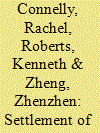

|
|
|
|
|
| Publication |
2011.
|
| Summary/Abstract |
This paper considers economic models of migration in the context of current Chinese migration. We argue that using formally changing one's household registration (hukou) location is too narrow a definition of settlement for policy purposes. Instead we show that time in the city and co-residence with spouses and separately with children reveals systematic settlement behavior on the part of a subset of migrants. The empirical evidence offered is largely descriptive but shows that those migrants who were younger at the age of migration, who are currently married and self-employed spend more years in the city. Men who have been in the city longer and are self-employed are much more likely to be co-residing with their wife. Self-employment is also a predictor of co-residence with children for both mothers and fathers.
|
|
|
|
|
|
|
|
|
|
|
|
|
|
|
|
| 14 |
ID:
177957
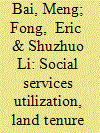

|
|
|
|
|
| Summary/Abstract |
This article explores whether the government policies are related to migrants taking on new self-identity. Drawing from the literature on identity, migrant adaptation, and citizenship, we propose a conceptual model of self-identity by rural migrants in China. We argue that self-identity of rural migrants is related to social policies that discourage a sojourner mentality and allow rural migrants to enjoy the same set of social benefits as local residents. Based on data collected in Xi’an in 2012, our findings support the argument. The findings have two important implications. First, our research shows that the simple dichotomy of rural versus urban in the literature regarding migrant workers in China may not be appropriate anymore, as a considerable proportion of migrant workers in China no longer identify themselves as rural residents and not urban residents. They identify themselves as “urban population from elsewhere” (chengshi wailai renkou). Second, our study opens a new venue for understanding self-identity of migrants. We offer an understanding of how social policies are related to self-identity.
|
|
|
|
|
|
|
|
|
|
|
|
|
|
|
|
| 15 |
ID:
145886


|
|
|
|
|
| Summary/Abstract |
Using data from a 2011 national household survey, this study examines the factors shaping urban residents’ prejudice toward rural-to-urban migrants and the impacts of prejudice on rural migrants’ integration into urban communities. The author addresses the endogeneity of the prejudice variable by employing an instrumental variable method. The results show that urban residents with higher education and household income report stronger prejudice. Also, urban residents with urban hukou at birth are more prejudiced toward rural migrants. Given that hukou status at birth is tied to parental hukou status, this result implies that prejudice can be transferred across generations. With regards to rural migrants’ integration into urban communities, high levels of prejudice in one’s current county of residence reduces perceived social standing of rural migrants and increases the number of livelihood problems they encounter. The author also conducts a falsification test, which provides support that the effect of urban residents’ prejudice on rural migrants’ integration is causal.
|
|
|
|
|
|
|
|
|
|
|
|
|
|
|
|
| 16 |
ID:
147407
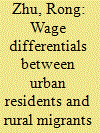

|
|
|
|
|
| Summary/Abstract |
This paper examines the wage differentials between urban workers and rural migrants in China's urban labor market. The wage differentials between the two groups are found to be higher at the top end than at the bottom part of the wage distribution in both 2002 and 2007. We decompose the distributional wage differentials between the two groups into a composition effect explained by differences in productivity characteristics, and a discrimination effect attributable to unequal returns to those characteristics. We find that the discrimination against migrant workers increases with the percentile of wage distribution in both 2002 and 2007. We also show that the discrimination against rural migrants has intensified during 2002–2007 throughout the wage distribution.
|
|
|
|
|
|
|
|
|
|
|
|
|
|
|
|
| 17 |
ID:
119391
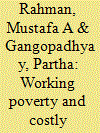

|
|
|
|
|
|
|
|